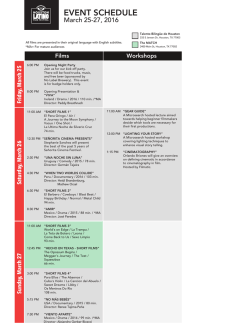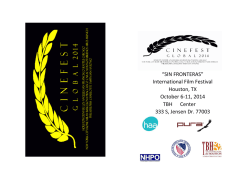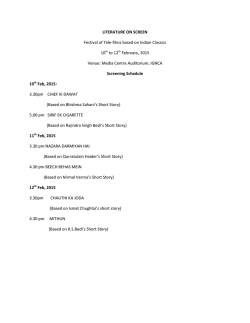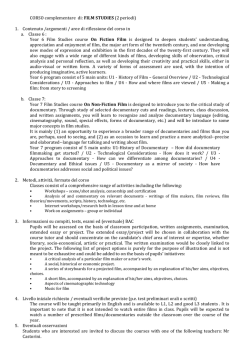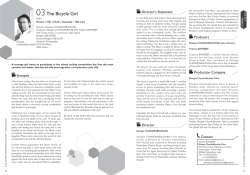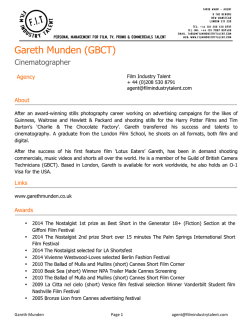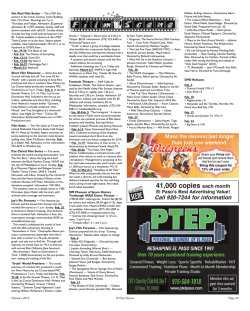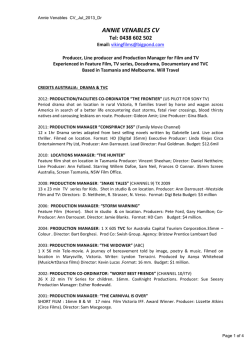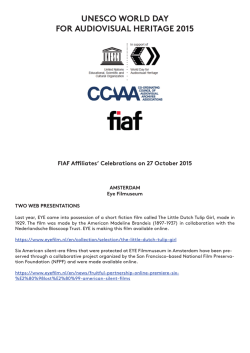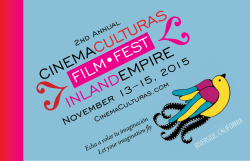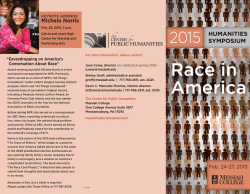
Feb Mar 2015 Overview - Brooklyn Academy of Music
FEB & MAR 2015 at BAMcinématek The Wall Street Journal is the title sponsor for BAMcinématek and BAM Rose Cinemas. Feb 5—22 (17 Days, 21 Films) JOHN CARPENTER: MASTER OF FEAR Carpenter in person for John Carpenter: Lost Themes, a conversation with Brooke Gladstone “One of the greatest horror directors of all time.” —Jason Zinoman, The New York Times Boasting “one of the most consistent and coherent bodies of work in modern cinema” (Kent Jones, Film Comment), Carpenter injects B-movie genres—horror, sci-fi, action—with the bravura stylistic technique of classical Hollywood giants like Hawks, Ford, and Hitchcock, and composes the scores for nearly all of his films. In conjunction with the release of his debut solo album Lost Themes—out Feb 3 through Sacred Bones Records—Carpenter makes a rare New York appearance at BAM for a discussion of his legendary film and music career moderated by NPR On the Media’s Brooke Gladstone. Following the talk on Feb 5, BAMcinématek presents a complete retrospective of the director’s feature films (Feb 6—22), opening with Carpenter’s breakout hit Halloween (1978), one of the most profitable independent films ever made. Other series highlights include horror masterwork The Thing (1982), the cult dystopian film They Live (1988), and more. The retrospective also features Carpenter Selects, a sidebar showcasing three films with exceptional scores that the director has cited as influences on his work: William Friedkin’s Sorcerer (1977), Sam Peckinpah’s Straw Dogs (1971), and sci-fi classic Forbidden Planet (1956). ALSO INCLUDES: Assault on Precinct 13 (1976), Big Trouble in Little China (1986), Christine (1983), Dark Star (1974), Escape from L.A. (1996), Escape from New York (1981), The Fog (1980), Ghosts of Mars (2001), Memoirs of an Invisible Man (1992), In the Mouth of Madness (1995), Prince of Darkness (1987), Starman (1984), Vampires (1998), Village of the Damned (1995), and The Ward (2010). FEB 24—26 (Three Days, Seven Films) FOG CITY MAVERICK: THE FILMS OF JOHN KORTY John Korty in person! Co-presented by Cinema Conservancy One of American independent cinema’s most distinctive, unsung voices, Oscar- and Emmy-winning Bay Area director/animator John Korty has quietly carved out a one-of-a-kind career over five decades and counting. Praised by Pauline Kael as one of the most “gifted, intelligent men outside the industry…attempting to make inexpensive feature-films as honestly and independently as they can,” and forgoing mainstream Hollywood ambitions despite his early associations with George Lucas and Francis Ford Coppola, Korty has pursued uncompromisingly original, refreshingly offbeat indie projects across narrative, documentary, animation and television that reflect his boundless visual imagination and glowingly humanistic outlook. Korty will appear in person throughout the series, which kicks off with an exceedingly rare 35mm screening of Korty’s eye-popping cult animation masterpiece Twice Upon A Time (1983), barely seen on the big screen in New York since its tragically limited original release. All films directed by John Korty. ALSO INCLUDES: The Crazy-Quilt (1966), Funnyman (1967), Imogen Cunningham, Photographer (1970), The Language of Faces (1961), The Music School (1974), and Who Are the DeBolts? And Where Did They Get Nineteen Kids? (1977). FEB 27—MAR 19 (17 Days, 21 Films, 15 in 35mm) BLACK & WHITE ’SCOPE: PART ONE—AMERICAN CINEMA In the late 1950s, sumptuous black and white met CinemaScope, producing movies that married the dramatic chiaroscuro of monochrome with the expressive freedom of the widescreen frame. Lensed by some of film history’s most renowned cinematographers—including James Wong Howe, Joseph LaShelle, Russell Metty, and Gordon Willis—these shimmering black and white beauties demand to be seen on the big screen. Series highlights include Billy Wilder’s Oscar-winning New York classic, The Apartment (1960), a sweet and sour evocation of love and loneliness in the big city starring Shirley MacLaine and Jack Lemmon; Martin Ritt’s blistering anti-Western Hud (1963), with Paul Newman as the titular “man with the barbed wire soul”; Otto Preminger’s gripping political drama Advise & Consent (1962); and David Lynch’s first studio film, The Elephant Man (1980), shot by celebrated DP and horror director Freddie Francis and featuring an Oscar-nominated performance by John Hurt. Part Two—International Cinema to follow. ALSO INCLUDES: Billy Budd (Ustinov, 1962), Bunny Lake is Missing (Preminger, 1965), China Gate (Fuller, 1957), In Cold Blood (Brooks, 1967), Forty Guns (Fuller, 1957), A Hatful of Rain (Zinnemann, 1957), The Haunting (Wise, 1963), The Hustler (Rossen, 1961), Lonely Are the Brave (Miller, 1962), The Longest Day (Annakin, Marton, Wicki, 1962), Manhattan (Allen, 1979), No Down Payment (Ritt, 1957), One, Two, Three (Wilder, 1961), The Outrage (Ritt, 1964), The Tarnished Angels (Sirk, 1957), The Three Faces of Eve (Johnson, 1957), The Victors (Foreman, 1963). MAR 7—12 (Six Days) RENDEZ-VOUS WITH FRENCH CINEMA America’s leading French film festival, which brings France’s top films to thousands of enthusiastic New Yorkers annually, returns to Brooklyn for the sixth time. Full slate of films and guests to be announced in January. Rendez-Vous with French Cinema is a co-presentation of uniFrance and the Film Society of Lincoln Center in collaboration with BAMcinématek. MAR 26—29 (Four Days) NEW VOICES IN BLACK CINEMA Co-presented by ActNow Foundation The fifth annual New Voices in Black Cinema festival, presented with the Fort Greene-based ActNow Foundation, reflects the wide spectrum of views and themes in the African diasporic communities in Brooklyn and beyond. Full slate of films and guests to be announced. For press information, please contact: Lisa Thomas at 718.724.8023 / [email protected] Hannah Thomas at 718.724.8002 / [email protected]
© Copyright 2026
